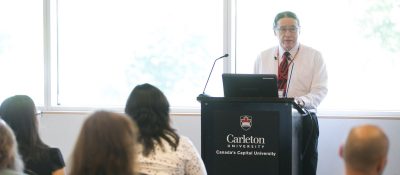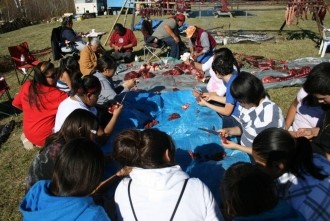by Katalin Eve Koller, PhD Candidate & CFICE Aligning Institutions for Community Impact RA
Indigenous Peoples share a historical memory and experience with academic research fraught with destructive power relations, structural violence, and imperial politics. Many academic disciplines contributed to the expansion of European imperialism across the globe, most often treating encountered Indigenous Peoples as a “savage” part of the landscape – to be studied as flora or fauna. In Canada, the relationship is further complicated by the fact that until 1951, Indigenous Peoples would lose their legal and ancestral identities and the rights associated with them if they obtained a university degree – a process called ‘enfranchisement’.

Professor John Medicine Horse Kelly presenting at the 2016 Carleton University Indigenous Research Ethics Institute
Since the 1990s, there has been an active movement within the academy to address these past injustices – in part thanks to the awareness generated by the eye-opening Royal Commission on Aboriginal Peoples (RCAP, 1996). The RCAP laid bare to Canadians an abundance of truth regarding the history of Indigenous Peoples in this place we have come to call Canada, and the role their assimilation played in shaping the Canadian state. This awareness played a part in policy efforts to make academia more accessible and inclusive for Indigenous Peoples, and Indigenous scholars were able to assert their voices and be heard as never before.
At present, there exists a burgeoning consciousness among critical researchers of the importance of recognizing and reconciling the legacies of our shared history so that academia can benefit from the full inclusion of Indigenous perspectives throughout the performance of research. Several guidelines relating to research conducted with Indigenous collaborators have been created, including (but not limited to) the following:
- Association of Canadian Universities for Northern Studies’ 2003 Ethical Principles for the Conduct of Research in the North;
- National Aboriginal Health Organization’s (NAHO) 2005 Ownership, Control, Access, and Possession (OCAP) or Self-Determination Applied to Research;
- Inuit Tapirit Kanatami (ITK) and the Nunavut Research Institute’s (NRI) 2006 Negotiating Research Relationships with Inuit Communities; and,
- CIHR, SSHRC, and NSERC’s 2010 Tri-Council Policy Statement: Ethical Conduct for Research Involving Humans, 2nd edition.
These ethical guidelines range from the Tri-Council’s themes of respect for persons, concern for welfare, and justice, to NAHO’s OCAP, which goes much further to delineate community choice, control, and ownership over the research process, emphasizing the immense socio-cultural value placed on knowledge and lifelong learning.

Youth learning to make dry meat as part of an intervention to build on community strengths and youth resilience in Alexis, Alberta – a CIET research initiative.
There also exists a growing literature by Indigenous scholars of methodologies, epistemologies, ontologies, and axiologies, or taken together, research paradigms, that provide a potent alternative to Western-based pathways for knowledge creation. Although there cannot ever be one universal approach to Indigenous methodologies, there are key principles that most methodologies hold in common (Louis, 2007). Research guided by these principles (the 4 R’s) can ensure a more balanced, ethical approach to the research process:
RELATIONAL ACCOUNTABILITY – emphasizes the interconnectedness of all life and thus stresses that all parts of the research process (and the relationships created therein) are related, from inspiration to expiration to inspiration anew. Relationality can be understood as interdependent accountability to human and non-human entities and the cyclical evolution of all knowledge.
RESPECTFUL REPRESENTATION – involves being conscious of how a researcher represents themselves, their research, and the people, places and things they write about. It is about listening with humility, generosity and patience to research collaborators and respecting the decisions that Indigenous Peoples make about what knowledge to share and when.
RECIPROCITY – relates to a balanced approach to research that ensures collaborators benefit equally to lead investigators. Reciprocity recognizes that research is a process of knowledge appropriation that requires mutual value be created for all those involved.
RIGHTS & REGULATION – speaks to the recognition of Indigenous Peoples’ protocols for engaging in research (such as the examples listed above) and Indigenous intellectual property rights. Rights and regulation protect Indigenous Peoples from historically extractive research processes and demand that the entire research process be a collaboration from start to finish. This includes working with Indigenous collaborators in a consent-based process to determine research parameters, design the research process, analyze and approve the findings, and guide the dissemination, even if that sometimes means that certain findings are not appropriate for sharing outside the community.
Indigenous research ethics do not apply only to academic engagement with Indigenous Peoples; they are also good practice for ‘Community First’ research with diverse communities in any setting. To learn more, check out the resources below or visit the Indigenous Research Ethics Institute at Carleton University.
Resources for further inquiry:
ACUNS. (2003). Ethical Principles for the Conduct of Research in the North. Ottawa: Association of Canadian Universities for Northern Studies.
Castleden, H., Sloan Morgan, V., & Lamb, C. (2012). “I spent the first year drinking tea”: Exploring Canadian university researchers’ perspectives on community-based participatory research involving Indigenous peoples. The Canadian Geographer, 56(2), 160-179.
de Leeuw, S., Cameron, E. S., & Greenwood, M. L. (2012). Participatory and community-based research, Indigenous geographies, and the spaces of friendship: A critical engagement. The Canadian Geographer, 56(2), 180-194.
ITK and NRI. (2006). Negotiating Research Relationships with Inuit Communities: A Guide for Researchers. Ottawa and Iqaluit: Inuit Tapirit Kanatami and Nunavut Research Institute.
Louis, R. P. (2007). Can you hear us now? Voices from the margin: Using Indigenous methodologies in geographic research. Geographical Research, 45(2), 130-139.
NAHO. (2005). Ownership, Control, Access and Possession (OCAP) or Self-Determination Applied to Research. Ottawa: National Aboriginal Health Organization.
Tri-Council. (2010). Tri-Council Policy Statement: Ethical Conduct for Research Involving Humans. Ottawa: Canadian Institutes of Health Research, Natural Sciences and Engineering Research Council of Canada, and Social Sciences and Humanities Research Council of Canada.
Tuhiwai Smith, L. (2012). Decolonizing Methodologies: Research and Indigenous Peoples (2nd edition). New York: Palgrave Macmillan.
Wilson, S. (2008). Research Is Ceremony: Indigenous Research Methods. Black Point: Fernwood Publishing.